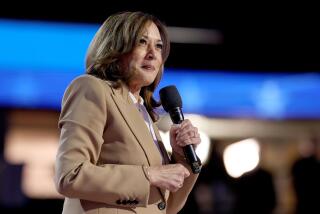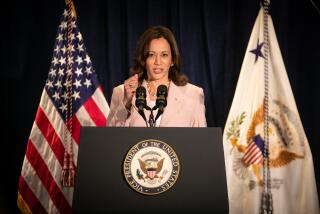Fear of Complacency Drove Clinton Fund-Raising Effort
- Share via
WASHINGTON — Like the mutant plant Audrey that demanded “feed me” in the movie “Little Shop of Horrors,” a portrait has emerged of President Clinton’s reelection campaign as a hungry creature ceaselessly agitating for infusions of cash.
But if the stockpile of recently released White House documents was a “user’s guide” to presidential fund-raising last year, it offered nary a word on the most fundamental question of all: Why was candidate Clinton--surging in the polls against a vulnerable foe--so obsessed with raising money?
In part, the campaign’s fixation on funding may be rooted in the personal experience of the president, who suffered a searing political defeat by a well-financed opponent in Arkansas in 1980, a lesson he has not forgotten.
On top of that, it was widely assumed within Clinton’s circle that the race would tighten somewhat in the fall, although the president’s aides remained confident of victory. Clinton’s strategists were also bracing themselves for an avalanche of Republican spending, which ultimately took place.
One Democrat who was familiar with the campaign’s strategy recalled the mood around Clinton in mid-1996, when survey after survey showed the president holding a commanding lead over Republican challenger Bob Dole.
“The formula for how we were doing things was working,” the Democrat said. “Nobody was going to sit back and say: ‘This is done. We don’t need to raise any more money. We don’t need to do this. We don’t need to do that.’ ”
The formula, of course, has ignited a reaction its creators never imagined, as Clinton’s second term unfolds amid a raft of investigations into the way funds were raised, the people who gave the money and the use of White House access in the process. The flap continues to obscure Clinton’s message, drain resources of the White House counsel’s office, embolden critics on Capitol Hill and preoccupy the media.
It also now looks like the scramble for dollars may have undermined the president’s election goals, with adverse publicity hurting Clinton’s bid to capture more than 50% of the popular vote and, perhaps, blocking Democrats from regaining control of the House. Some doubt the benefit of millions of dollars in advertising in 1995--a $35-million expense pushed by former advisor Dick Morris that triggered the wild rush for dollars that has come back to haunt the president.
“Did all of the ads do any good?” asked James Carville, the Democratic campaign consultant and Clinton ally, alluding to doubts about the expenditure. “I don’t know the answer.”
There is no doubt, however, that the president, a lifelong student of politics, long ago absorbed the significance of raising money. His own budding career as the youthful governor of Arkansas was temporarily derailed in 1980 by a well-financed conservative named Frank White.
In mid-October of that year, “Clinton was stunned to learn that White had raised almost $400,000--only about $15,000 less than Clinton had raised,” recalled Meredith Oakley, author of a 1994 book on Clinton. “This was followed immediately by a Clinton poll showing that White was only 15 points behind and coming on strong.”
The dollar signs proved to be an accurate indicator: Clinton lost that race.
*
Sixteen years later, it was an article of faith among the president’s advisors that his lead over Dole could prove fleeting. Indeed, last spring, as the dimensions of Clinton’s lead became apparent, he repeatedly cautioned aides to “remember Greg Norman,” the golfer who a few weeks earlier had blown a six-stroke advantage in the Masters tournament, losing the championship by five.
“Clinton, having faced political death many times in his career, never took anything for granted,” said Mike McCurry, the White House press secretary. “The mentality was ‘don’t be artificially lulled into complacency, because you can lose your lead in a flash.’ ”
To some, such fears were no absurd stretch. For much of Clinton’s first term, especially before the GOP-inspired shutdowns of the federal government, Washington insiders had been quick to dismiss the president’s reelection prospects as the administration seemed to zigzag from one misstep to another. The Republicans’ smashing victory in the midterm elections of 1994 only reinforced the perception of Clinton as a temporary figure in the White House.
“In early ‘95, the debate wasn’t whether the president was popular or not,” one Democrat said. “The debate was whether the president was relevant or not.”
*
Those kinds of concerns provide the backdrop to the fevered effort to raise funds. In his book, “Behind the Oval Office,” Morris writes that he pushed hard for Democratic ads attacking Republicans on the budget and other issues starting in 1995, as a way to soften up the opposition long before the election.
It was a fateful strategic decision that set in motion the Democrats’ pell-mell drive for money and the unprecedented commitment of White House resources to the effort.
Raising the cash to pay for all these ads--$10 million during the last few months of 1995 alone, according to Morris--required the personal salesmanship of the president, Vice President Al Gore and First Lady Hillary Rodham Clinton.
The release of a telephone-book-thick trove of documents compiled by Harold Ickes, former White House deputy chief of staff, made it clear that fund-raising anxiety continued well into 1996, despite Clinton’s double-digit lead over Dole.
In a July 28, 1996, memo about lagging direct-mail receipts, Ickes noted the “irony” that Clinton’s strength was holding down revenues. The direct-mail totals were failing to reach targets, he wrote, “ironically because of the president’s very favorable standing in the polls.”
Under complex federal regulations, certain types of donations made to a candidate, such as direct mail, can be used for more purposes and thus are more valuable to the campaign than undesignated “soft money” given to a political party.
Similarly, the presence of Clinton or Gore at a fund-raiser also was a way to push up donations that could be shared with House and Senate candidates, a consideration that became increasingly important in the final months of the campaign.
“While there have been suggestions that the president and vice president should substantially reduce their fund-raising efforts in September and October . . . , it would be ill-advised,” Ickes concluded in another July memo.
Joseph Lockhart, press secretary of the Clinton-Gore reelection campaign, said that the campaign believed that, “if the American public chose Bob Dole’s vision for the future over the president’s, we’d all have to live with that. But we were determined not to lose the election because we didn’t have the resources to get our message out and give Americans a clear choice.”
The president was proved right in one key financial respect: Republicans did unleash a wave of spending at the end of the campaign, outspending Democrats overall by more than $200 million, a figure that Clinton supporters believe has received insufficient attention in the outcry over fund-raising.
*
But what was the cost of the Democrats’ own dash for dollars? It is hard to sort out, especially in light of the GOP’s last-ditch push. Clearly, though, as news reports increasingly focused on overseas links to donations rather than the president’s on-the-stump message, his own progress, along with the Democratic bid to regain the House and Senate, bogged down in the campaign’s final days.
“There’s a common analysis that the Democrats’ campaign stalled out two weeks before the election in part because of the controversy around fund-raising and that jeopardized our chances to take back the House,” said Celinda Lake, a Democratic consultant.
Another consultant concluded that embarrassing disclosures concerning fund-raising ultimately cost Clinton more votes than he gained from the early television barrage. “I think it is ironic,” he said.
Nonetheless, pointed out Democratic pollster Mark Mellman: “Had they spent less, they may have gotten fewer votes. The goal is not just to win, but to win convincingly.
“I think Bill Clinton understands the power of money in politics.”
More to Read
Get the L.A. Times Politics newsletter
Deeply reported insights into legislation, politics and policy from Sacramento, Washington and beyond. In your inbox twice per week.
You may occasionally receive promotional content from the Los Angeles Times.










